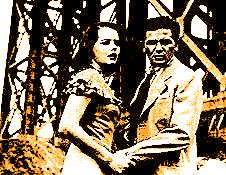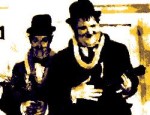Film Review
Force of Evil is an unusual
yet remarkably effective example of classic film noir which combines
the familiar trappings of the American gangster film with a serious
polemic on the dangers of rampant capitalism. An essential
element of film noir is moral ambiguity, so this style is certainly
appropriate for a film which draws disturbing parallels between
organised crime and supposedly lawful corporate activity.
This was Abraham Polonsky's first work as a director - he had
previously established himself as one of Hollywood's most promising
screenwriters with
Body and Soul
(1947). Unfortunately, this was also very nearly his last film.
Polonsky was a committed Communist at a time when this was not a good
thing to be. When he refused to testify before the House
Un-American Activities Committee in 1951, he was blacklisted from
working in Hollywood and it would be 21 years before he directed
another film.
The Force of Evil employs an
unusual mix of styles - the heightened expressionism of film noir,
strikingly realist exterior shots and a quasi-documentary narrative
format. These work together remarkably well to evoke a sombre
mood of confinement and unremitting oppression, but with a note of
optimism. The beautifully composed noir cinematography, with its
stark lighting and unsettling camera angles, conveys the intense
psychological trauma experienced by the two main protagonists in the
drama, skilfully played by John Garfield and Thomas Gomez.
There is a subtle interplay between the familiar film noir themes of
corruption, betrayal and guilt and the humanist themes of hope and
redemption, suggestive of the eternal conflict between Man's two
opposing natures, the desire for good and his propensity for
evil.
© James Travers 2008
The above content is owned by frenchfilms.org and must not be copied.
Film Synopsis
Joe Morse is a young Wall Street lawyer who isn't going to allow his
conscience to get in the way of his making his first
million. Working for the racketeer Ben Tucker, Joe has
converted an illicit numbers operation into a lawful yet very lucrative
lottery. However, Tucker isn't content with the modest earnings
this brings his way. He intends to rig the outcome of the lottery
so that he can drive all of his smaller competitors to ruin, allowing
him to take over their businesses. One of these small outfits
just happens to be owned by Joe's older brother, Leo...
© James Travers
The above content is owned by frenchfilms.org and must not be copied.


